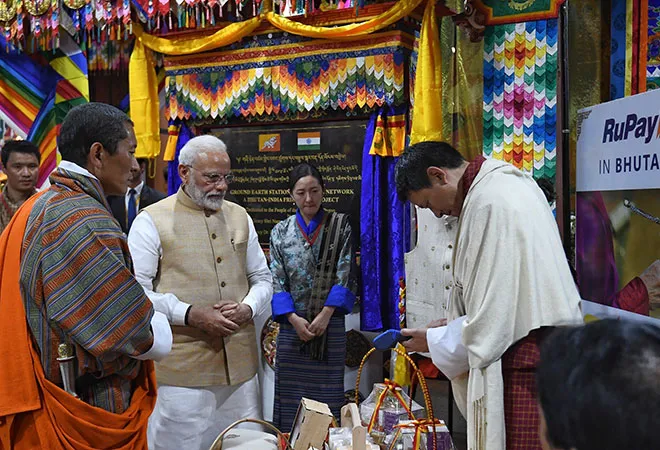-
CENTRES
Progammes & Centres
Location
Bhutan seeks to develop its digital and space sectors to fulfil the aspirations of its new generation and India has stepped up to facilitate this endeavour.

In the 51st year of diplomatic relations, India and Bhutan added a new chapter to their bilateral cooperation by expanding their engagement to digital and space domains. Several key initiatives were launched by the prime ministers of India and Bhutan in the digital and space sectors on 17 August 2019, such as RuPay, integration of DrukREN with National Knowledge Network of India and inauguration of the Ground Earth Station constructed by ISRO.
Bhutan being a landlocked country with limited internal and external connectivity, has had issues accessing the world market. To overcome this handicap and be connected to the world through the digital domain, it has embarked on a journey to develop its digital sector. Bhutan seeks to reduce its over dependence on the hydropower sector for exports, revenue generation and employment generation due to its lack of sustainability in the long run. Redirecting focus towards the digital sector is thus, a more reliable source for employment generation and foreign exchange earnings through exports of IT and IT Enabled Services (ITES). Keeping this in mind, the first tech park and incubation center was established in Thimphu in 2012 to attract foreign investments and generate jobs for the youth. The new government under PM Lotay Tshering is also, focusing on developing Bhutan’s digital and space infrastructure to harness the potential of the youth through adequate generation of employment while ensuring that skill development remains at par with world standards.
Bhutan seeks to reduce its over dependence on the hydropower sector for exports, revenue generation and employment generation due to its lack of sustainability in the long run.
Bhutan and India have a long history of bilateral cooperation based on mutual trust and good neighbourly relations. India’s prowess as a tech giant and its remarkable experience in the digital and space sector with world-class and affordable technology acts as a ‘pull’ factor for Bhutan. Bhutan thus, seeks India’s investments and expertise in bringing about transformation in its digital and space sectors.
India’s commitment to Bhutan’s development under it’s ‘neighbourhood first’ policy justifies its cooperation in digital and space sectors in order to reduce the heavy dependence of the bilateral cooperation on the hydropower sector. Through its digital and space cooperation, India aims to spread its technological footprint and help Bhutan build a capital-intensive digital infrastructure. India also seeks to supplement the goal of ‘narrowing the gap’ given by the current government of Bhutan, by diversifying and changing the composition of its development cooperation to include investments in digital and space sectors.
India and Bhutan have begun their digital cooperation through initiatives that cater to the banking and education sectors. The collaboration in the space domain mainly pertains to harnessing the services of the South Asia Satellite. One of the defining collaborations has been in the banking sector, with the launch of RuPay. RuPay’s rollout revolutionises financial transactions and paves the way for financial inclusion in Bhutan, which faces difficulties in providing physical infrastructure such as banks and ATMs to its remote areas. The benefit accruing to India is mainly an increase in the global reach of its indigenous payment system and increase in digital payments across the two countries thus easing tourism and cross border business transactions. To promote cashless transactions within Bhutan, an agreement on studying the feasibility of launching India’s BHIM app was also signed.
RuPay’s rollout revolutionises financial transactions and paves the way for financial inclusion in Bhutan, which faces difficulties in providing physical infrastructure such as banks and ATMs to its remote areas.
The integration of Bhutan’s DrukRen with India’s National Knowledge Network is a key cooperation in the domain of e-Learning. The integration ensures secure and fast connectivity between the universities, research institutions, libraries, healthcare and agricultural institutions of the two nations. This cooperation is significant for the young Bhutanese who aspire to get world-class education such as courses and learning materials in their own country.
Collaboration in the space sector mainly involves enhancing Bhutan’s capacity to harness the services of the South Asia Satellite through the construction of Ground Earth station and SATCOM by ISRO. This initiative boosts the tele-medicine, tele-education and disaster management in Bhutan. A defining cooperation in the space sector has been the agreement for the development and launch of a small satellite by young Bhutanese scientists in India.
The focus of India-Bhutan relations in the digital age has turned towards the youth while maintaining the traditional aspects of the relations. Bhutan seeks to develop its digital and space sectors to fulfil the aspirations of its new generation and India has stepped up to facilitate this endeavour that the mountain kingdom intends to take forward.
The author is a research intern at ORF New Delhi.
The views expressed above belong to the author(s). ORF research and analyses now available on Telegram! Click here to access our curated content — blogs, longforms and interviews.

Shreya Mishra is Masters in International Relations. She currently works as a Junior Research Fellow at Jindal School of International Affairs O.P. Jindal Global University. ...
Read More +